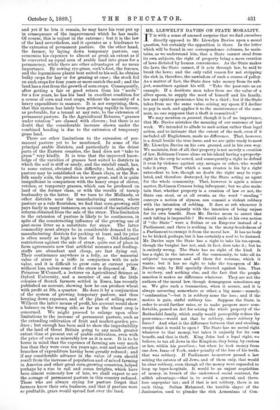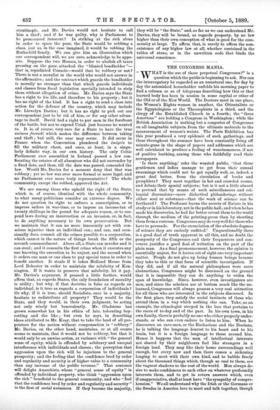MR. LLEWELYN DAVIES ON STATE MORALITY. TT is with a
sense of amused surprise that we find ourselves directly opposed to Mr. Llewelyn Davies upon a moral question, but certainly the opposition is there. In the letter which will be found in our correspondence columns, he main- tains, as we understand him, that a State cannot steal from its own subjects, the right of property being a mere creation of laws dictated by human convenience. As the State makes the laws, the State cannot, if it acts through law, be said to break the laws ; and the only valid reason for not stripping the rich is, therefore, the unwisdom of such a' course of policy. As a matter of fact, the State does take money from its sub- ject, sometimes against his will. " Take the poor-rate as an example. If a destitute man takes from me the value of a silver spoon, to supply the need of himself and his family, law and opinion pronounce him to be a thief ; but if the State takes from me the same value, seizing my spoon if I decline to pay in cash, and applies it to the maintenance of the same man, no one supposes that a theft is committed."
We may mention en passant, though it is of no importance, that Mr. Davies mistakes the meaning of our sentence of last week. We intended• to allude to mob action rather than legal action, and to intimate that the extent of the mob, even if it included all Englishmen; made no difference. That, however, is a detail beside the true issue, and we are quite ready to meet Mr. LleweIyn Davies on his own ground, and in his own way. We maintain, first of all, that property is not merely a creation• of law, Robinson Crusoe alone on his island having a property- right in the crop he sowed, and consequently a right to defend it even by violence against any, savages or other, who would take it away. That which a man creates is his by a right antecedent to law, though no doubt the right may be regu- lated, and therefore destroyed, by the State acting as agent for the whole community. That, however, is again a minor matter, Robinson Crusoes being infrequent ; but we also main- tain that, whether property is a creation of law or not, the State can steal, or at all events, as the word " stealing " conveys a notion of slyness, can commit a violent robbery with the intention of robbing. It does so rob whenever it takes property unjustly with the intention- of being unjust for its own benefit. Does Mr. Davies mean to assert that such taking is impossible ? He would smile at his own notion if "the State" were a Sultan or an Emperor instead of a Parliament, and there is nothing in the many-headedness of a Parliament to exempt it from the moral law. It has no body to be kicked, perhaps, but it has certainly a soul to be damned, Mr. Davies says the State has a right to take his tea-spoon, though the burglar has not, and, in fact, does take it; but he is entirely wrong. The State has no right of the kind. It has a right, in the interest of the community, to take all its subjects' tea-spoons and sell them for revenue, which it wants ; but it has no right to take the tea-spoon of Mr- Davies only, by Bill specially directed against him. That is robbery, and nothing else, and the fact that the people sanction it makes no difference whatever. They are not the authors of the moral law, though demagogues- sometimes say so. We give such a transaction, when it occurs, and it is always occurring somewhere or other, a big name—namely, " confiscation "—but it is robbery none the less ; and if the motive is gain, sinful robbery too. Suppose the State, in
order to avoid further rates, or to make paupers more com fortable, passed an Act for seizing the whole property of the Rothschild family, which really would perceptibly reduce the
poor-rates,—would not that be robbery, sheer robbery by force ? And what is the difference between that and stealing,
except that it would be open ? The State has no moral right
whatever to that money, but takes it unjustly for its OWII benefit, and that is theft. King John had a legal right., we believe, to tax all Jews in the Kingdom, they being, by custom or law, within his peculiur ; but when be took money from
one Jew, Isaac of York, under penalty of the loss of his teeth, that was robbery. If Parliament to-morrow passed a law seizing the estates of all Jews, and of them only, that would be clear robbery, even though all the money were expended to
keep up leper-hospitals. It would be an unjust acquisition of money, in breach of the understood social contract, for
selfish advantage,—that is, to avoid a general, and there- fore unpopular tax; and if that is not robbery, there is no such thing. Sultan Mahmoud, the terrible slayer of the Janissaries, used to plunder the rich Armenians of Con-
stantinople, and Mr. Davies would not hesitate to call him a thief ; and if he was guilty, why is Parliament to be pronounced innocent P In striking at the rich alone in order to spare the poor, the State would be robbing a class, just as, in the case imagined, it would be robbing the Rothschild family. We can give him an illustration which our correspondent will, we are sure, acknowledge to be appo- site. Suppose the two Houses, in order to abolish all taxes pressing on the poor, attacked the "bloated bondholder "- that is, repudiated Consols—would that be robbery or not P There is not a moralist in the world who would not answer in the affirmative; and the contract which guards the bondholder is morally no stronger than that which guards individuals and classes from fiscal legislation specially intended to strip them without allegation of crime. Mr. Davies says the State has a right to his life, and therefore to his property ; but it has no right of the kind. It has a right to send a class into action for the defence of the country, which may include Mr. Llewelyn Davies ; but it has no right to pick out our correspondent just to be rid of him, or for any other advan- tage to itself. David had a right to put men in the forefront of the battle, but not to expend Uriah just because he wanted to. It is, of course, very rare for a State to have the true animus furendi which makes the difference between taking and theft ; buf still, the case may occur. It did occur in France when the Convention plundered the emigres to fill the military chest, and once, at least, in a singu- larly definite way, in our own history. The only Celtic Parliament ever assembled in Ireland passed a law con- fiscating the estates of all absentees who did not surrender by a fixed date, and then; till the date was passed, concealed the law. Would Mr. Davies for a moment deny that that was robbery; yet no law was ever more formal or more legal, and no Parliament ever more truly representative ? The whole .community, except the robbed, approved the Act.
We are among those who uphold the right of the State, which is, of course, identical with the whole community, to what many politicians consider an extreme degree. We do not question its right to enforce a conscription, or to impress sailors in war-time, or to impose an income-tax of twenty shillings in the pound for adequate reason, or to sus- pend laws during an insurrection or an invasion, or, in fact, to do anything necessary to its own preservation. But we maintain that it can no more innocently act with con- scious injustice than an individual can ; and can, and occa- sionally does, commit all the crimes possible to a corporation, which cannot in the nature of things break the fifth or the seventh commandment. Above all, a State can murder and it can steal ; and it commits the first crime when it executes any one knowing the execution to be unjust, and the second when it orders one man or one class to pay special taxes in order to benefit another. It steals if it takes Holland House from Lord Ilchester in order to maintain the salubrity of Ken- sington. If it wants to preserve that salubrity, let it pay. Mr. Davies's argument, if pressed a little farther, would affirm that, as regards States, the only foundation of morality is utility ; but why, if that doctrine is false as regards an individual, is it true as regards a corporation of individuals P Or why, if it is true, should Socialists, once in a majority, hesitate to redistribute all property? They would be the State, and they would, in their own judgment, be acting not only wisely but benevolently. Mr. Gladstone has grown somewhat lax in his ethics of late, tolerating boy- cotting and the like ; but even he says, in describing ideas attributed to Mr. Keay, that to take the land of all pro- prietors for the nation without compensation is "robbery." Mr. Davies, on the other hand, maintains, or at all events seems to maintain, that it would not be robbery, but that it would only be an unwise action, at variance with " the general sense of equity, which is offended by arbitrary and unequal interference with individuals and classes ; the perception that aggression upon the rich will be injurious to the general prosperity; and the feeling that the confidence bred by order and regularity and security is of higher value to a community than any increase of the public revenue." That sentence will delight Anarchists, whose " general sense of equity" is offended by individual property, who think " aggression upon the rich " beneficial to the general community, and who " feel that the confidence bred by order and regularity and security " is the first of social nuisances. If they become the majority,
they will be "the State," and, as far as we can understand Mr. Davies, they will be bound, as regards property, by no law higher than their own conception of what is good for the com- munity at large. To affirm that, is surely to affirm the non- existence of any higher law at all, whether contained in the tables of stone, or in the unwritten code that binds the universal conscience.







































 Previous page
Previous page